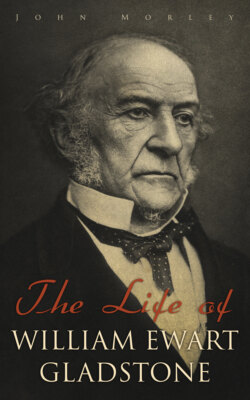Читать книгу The Life of William Ewart Gladstone - John Morley - Страница 14
На сайте Литреса книга снята с продажи.
IV
AT WILMSLOW
ОглавлениеSome months passed between leaving Eton and going to Oxford. In January 1828, Gladstone went to reside with Dr. Turner at Wilmslow in Cheshire, and remained there until Turner was made Bishop of Calcutta. The bishop's pupil afterwards testified to his amiability, refinement, and devoutness; but the days of his energy were past, and 'the religious condition of the parish was depressing.' Among the neighbouring families, with whom he made acquaintance while at Wilmslow, were the Gregs of Quarry Bank, a refined and philanthropic household, including among the sons William R. Greg (born in the same year as Mr. Gladstone), that ingenious, urbane, interesting, and independent mind, whose speculations, dissolvent and other, were afterwards to take an effective place in the writings of the time. 'I fear he is a unitarian,' the young churchman mentions to his father, and gives sundry reasons for that sombre apprehension; it was, indeed, only too well founded.
While at Wilmslow (Feb. 5, 1828) Gladstone was taken to dine with the rector of Alderley—'an extremely gentlemanly and said to be a very clever man,'—afterwards to be known as the liberal and enlightened Edward Stanley, Bishop of Norwich, and father of Arthur Stanley, the famous dean. Him, on this occasion, the young Gladstone seems to have seen for the first time. Arthur Stanley was six years his junior, and there was then some idea of sending him to Eton. As it happened, he too was a pupil at Rawson's at Seaforth, and in the summer after the meeting at Alderley the two lads met again. The younger of them has described how he was invited to breakfast with William Gladstone at Seaforth House; in what grand style they breakfasted, how he devoured strawberries, swam the Newfoundland dog in the pond, looked at books and pictures, and talked to W. Gladstone 'almost all the time about all sorts of things. He is so very good-natured, and I like him very much. He talked a great deal about Eton, and said that it was a very good place for those who liked boating and Latin verses. He was very good-natured to us all the time, and lent me books to read when we went away.'33 A few months later, as all the world knows, Stanley, happily for himself and for all of us, went not to Eton but to Rugby, where Arnold had just entered on his bold and noble task of changing the face of education in England.
